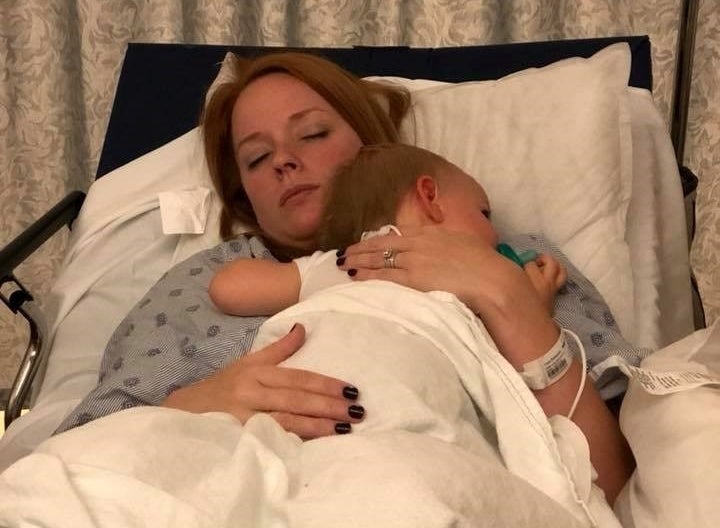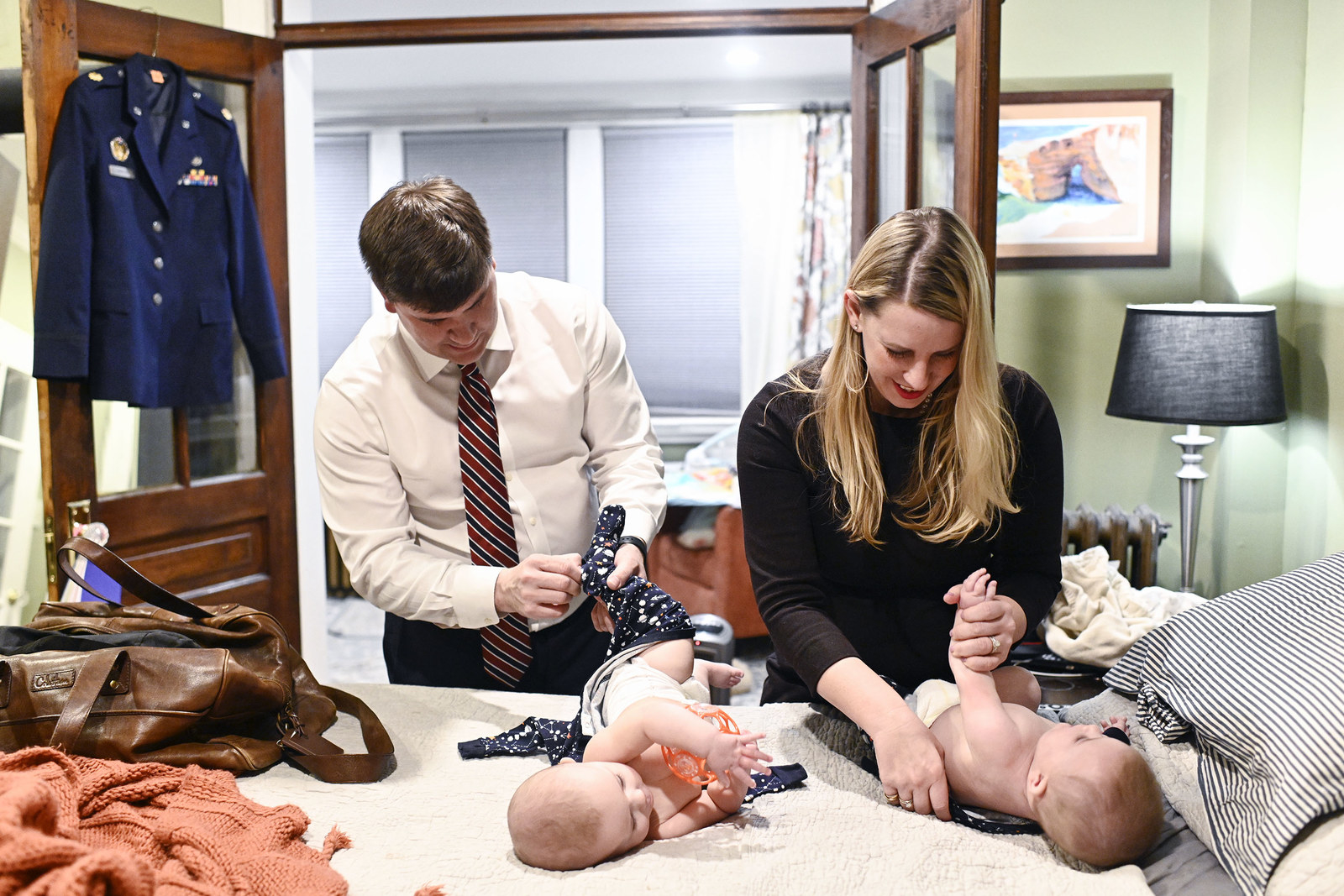WASHINGTON — They didn’t want to complain — being a woman in the US military, the last thing you want to be seen as is weak — but the sharp abdominal pain was becoming debilitating. Military doctors dismissed it as “female problems,” period cramps. It was “normal,” they were told. It was said or implied that they were overreacting. They were given painkillers and birth control, and told to report back to duty.
Those orders landed six of the more than a dozen female service members interviewed by BuzzFeed News in the hospital, fighting for their lives. One was in the ER a few weeks later with a “baseball-sized cyst,” bleeding internally. Another underwent an experimental, highly invasive, and botched surgery by a military doctor. Several had hysterectomies. All now live with infertility; chronic, debilitating pain; and sky-high medical bills. It wasn’t period cramps.
Interviews with more than a dozen current and former female service members — spanning different branches, decades, and deployments — revealed striking similarities in the way they were brushed off, misdiagnosed, and provided the wrong treatments by US military doctors around the world. In the cases of at least six of the women who spoke to BuzzFeed News, military doctors' inability or unwillingness to properly diagnose women’s health problems put their lives at risk and often created serious new medical issues. For many, it ended their military career. Most said they were properly, quickly, and easily diagnosed by civilian doctors after meeting dead ends with military doctors for years.
While the Defense Department hasn’t done a comprehensive survey of women’s health issues in 30 years, female service members have long reported receiving inadequate medical care and higher rates of infertility, especially when deployed abroad, in smaller-scale, targeted studies and surveys. More recently, a study released in December by the Service Women’s Action Network (SWAN) found that the roughly 800 current and former female service members surveyed were about 30% more likely to struggle with infertility than civilian women.
This year, Pentagon-contracted researchers are expected to begin the first comprehensive study of female service members’ health issues since 1989. Experts say it will provide sorely needed data to back up decades of often horrific anecdotal evidence — usually suppressed and only shared among female service members in private — of the real cost of moving too slowly to adapt to women in the ranks.
At a time when more women are serving in the US military than at any other point in history, military leaders and lawmakers are realizing that not taking the health issues of female soldiers, Marines, sailors, and airmen seriously is impacting military readiness.
But it's taken women rising to leadership positions — four-star generals, combatant commanders, and lawmakers on armed services committees — for this issue to gain any traction.
“I laugh when [the Pentagon] says they take care of women in the military,” Rebecca Lipe, a retired Air Force captain who served in Iraq, told BuzzFeed News. “No. Women in the military take care of other women in the military.”
There is a pervasive problem in the medical community writ large of dismissing women’s pain as false or exaggerated, but it is exacerbated in a mostly male military environment with a lingering resistance to women in their ranks, and a lack of understanding of how military service impacts women differently than men. And there’s evidence the problem hasn’t gotten better as more women have entered the military; the women who spoke to BuzzFeed News described having similar issues in the late 1990s and early 2000s as others did in the past few years.

“I was treated as if I was in the wrong”
Lipe was an Air Force captain and deputy staff judge advocate (a senior lawyer) in Iraq in 2011. Only 27 years old at the time, she was in charge of overseeing five bases’ compliance with military and federal law as well as advising local Iraqi criminal courts, a job that required a lot of off-base travel by helicopter and convoy. This meant she was constantly wearing body armor — body armor that was designed for men.
“Theoretically if you get shot in the side, there’s side panels, but I couldn’t even wear those, because I couldn’t get it to fit or stay on correctly,” she said. “So if I ever were to get hit in the side that would— that would be a bad thing,” she told BuzzFeed News.
Like many of her female colleagues, Lipe had to adapt the body armor as best she could. The only way it would protect her vital organs the way it was meant to was if she stuck foam rubber under the shoulder straps to lift it up, she said.
It wasn’t until later that she found out that wearing this ill-fitting equipment weighing more than 40 pounds, while sitting at the 90-degree angles forced by military convoy seats for hours and days on end, likely caused multiple “sports herniations” in her pelvis. When she went to the doctors on base seeking treatment for intense pelvic pain, they insisted it was not a hernia, medical records reviewed by BuzzFeed News show. Instead they became convinced it was symptoms of a sexually transmitted disease, and repeatedly tested Lipe for STDs despite her insistence that there was practically no way she could have one. She was married and faithful to her husband, she told them, but they kept asking her if she was having an extramarital affair.
“I was treated as if I was in the wrong,” Lipe, now 36, told BuzzFeed News, speaking from her office in Chicago where she works as an attorney after retiring from the Air Force. “Clearly they thought I must have been this adulterous, excuse me, whore who was doing something wrong. And I was like, look, I’m the lawyer here, I’m the one enforcing these rules, you have to be kidding me.”
All the STD tests came up clean, records show, but the pain got worse. It got so bad that she stopped being able to walk to the dining facility for meals. The doctors told her it was her endometriosis (a common disorder that leads to unusually painful menstruation) but she knew what that felt like, and this wasn’t it. Within a few days she had to be medically evacuated to the Landstuhl Regional Medical Center in Germany, a trip that only exacerbated her injury, Lipe said. No one believed she was in as much pain as she was. She could barely get up, but they made her walk and carry her own bags to the plane, where the nurses refused to give her the amount of painkillers the doctors had prescribed her for the flight, records reviewed by BuzzFeed News show.
“I was literally being told this was all in my head. There’s only so much you can be told that before you start to think you’re going crazy.”
At first, the military doctors in Germany refused to admit her, saying it was just period cramps, Lipe said, until a higher-ranking officer insisted on her behalf. The records show Lipe was told she had developed a pelvic infection in Iraq from unknown causes (a diagnosis her OB-GYN later wrote in her records, after consulting with nonmilitary specialists, was incorrect and made “without any objective evidence”). Not knowing what else was wrong with her, she was shipped back to the US, to Eglin Air Force Base in Florida for further treatment.
“I spent the next two years having to advocate for myself to the point of defending my mental health,” Lipe said, echoing a sentiment expressed by every woman who spoke to BuzzFeed News. “I was constantly in pain … I got to the point where I was suicidal because I was literally being told this was all in my head. There’s only so much you can be told that before you start to think you’re going crazy.”
Finally, almost exactly a year after Lipe first started experiencing the pain, a private, nonmilitary reproductive endocrinologist and general surgeon in Jacksonville, Florida, figured out what was wrong with her — multiple small pelvic hernias caused by the ill-fitting body armor. It took two one-hour appointments, her records show, and they knew exactly how to fix it. After extensive surgery to fix eight areas of her abdominal wall, she began to improve.
However, due to the delay of proper treatment and the many procedures and medications military doctors prescribed for problems she did not have, Lipe had become hormonally depleted. It caused nerve damage and vaginal atrophy, her medical records show, that prevented her from having sex with her husband, and she had trouble conceiving naturally.
“I won’t ever go back to a military medical facility,” Lipe said.
While Lipe’s case was extreme, the military’s own surveys show a widespread problem with women getting access to health care.
According to a 2006 military study of female soldiers who served in Operation Iraqi Freedom, 44% could not access gynecologic care during their deployment. A later study in 2009 found that 35% of female soldiers had at least one gynecologic problem while they were deployed in Iraq, with 11.5% having to take the risk of traveling by ground convoy and 28% by air to obtain care.
Many other women described similar ordeals to BuzzFeed News, with misdiagnosis of fairly common medical issues as “female problems” — a term every woman who spoke to BuzzFeed News used to refer to menstruation, saying it was what men in the military said as well — not only interrupting their military careers but causing long-term injuries.
All the women who spoke to BuzzFeed News said the pressure to “suck it up” and fight the perception of being seen as weak was especially acute as female service members. Many of the men they served with or who treated them saw women as “problem soldiers” — especially if they complained about pain, they said. They all said some of the men made it clear they thought the military was no place for women at all.
“I can only guess a lot of other women feel this way, but I never want to be perceived as a whiner. I don’t wanna be a complainer,” retired Air Force Maj. Annie Morgan, who experienced similar issues, told BuzzFeed News. “I feel a certain need to be tough, and I don’t know if the military’s telling me that or if I’m imposing this on myself because I know I’m in the minority.”

If you have to repeatedly tell your superiors and the medics on site that you’re in pain, “it proves their thinking that women shouldn’t serve in certain capacities,” Catherine Harris, who retired last year as a first sergeant in the Army, told BuzzFeed News said. “So you think, OK, I’m gonna keep quiet so I don’t ruin someone else’s chances of doing this.”
But the pain got so bad for the women who spoke to BuzzFeed News that they couldn’t keep quiet anymore. It was interfering with their jobs, their military service, and their lives. Three of the women were accused of malingering while they were experiencing chronic, debilitating pain. All of them said that this constant denial of their pain took a mental toll on them.
“We don’t want special care, we want the same level of quality care that the men have,” Harris said.
A recent analysis of military medical research put out between 2000 and 2015 found that “research on the US military has until recently focused almost exclusively on the health of male service members,” and that gynecological care had the highest percentage of low-quality articles and information available to service members.
“We don’t want special care, we want the same level of quality care that the men have.”
For Harris, 47, her problems started after an accident in the early 2000s in Fort Jackson, South Carolina. She was on duty driving two soldiers when the rear axle of the truck gave out, rolling over several times, she told BuzzFeed News. Harris said she went to the hospital complaining of lower abdominal pain, which continued and got more severe over time. As with five other women who spoke to BuzzFeed News, she said the military doctors dismissed her pain as connected to her period — “female problems” — and prescribed her several different kinds of birth control, none of which worked.
Harris told BuzzFeed News she had trouble with infertility after that, and lost two pregnancies. During a third pregnancy, she said she was sent to a nonmilitary doctor, because she was considered to have a “high-risk” pregnancy. That doctor discovered large ovarian cysts that endangered her life and her pregnancy, requiring her to undergo a risky operation. Luckily, she and her daughter survived both the procedure and the birth.
But Harris's pain continued for years, as military doctors continued to insist it was only period cramps, she said. It grew worse in 2013 after she deployed to Afghanistan, where she underwent several physically traumatic experiences, including being in an aircraft that came under fire and being proximate to an explosion, she said. The pain came to its peak in 2015 when she was stationed at the US Army garrison in Vicenza, Italy. Before she deployed, a doctor had installed an IUD in an attempt to help the issues caused by the abdominal trauma, but it had to be removed when it started causing her pain. By the time she left the military, in June 2017, she had to have a hysterectomy, Harris said. She went into early menopause at 45 years old.
Military doctors and Pentagon officials told BuzzFeed News they could not discuss specific cases, but insisted their priority is to maintain the health and well-being of all service members, men or women, so they can fulfill their mission.

But the women who spoke to BuzzFeed News said that the “one size fits all” approach, from health care to body armor, simply does not work as the number of female service members continues to rise. For example, 12.3% of female recruits developed hip stress fractures compared to 2.4% of their male counterparts, partly because hip belts and the metal frames for their packs are designed for men’s bodies according to one analysis of US Army recruits. It cites a study — conducted more than 20 years ago — that suggested that female soldiers would not only be able to avoid injury but also close the time gap between them and male soldiers if packs could be designed for the female anatomy.
Such experiences not only hurt female service members, but also damage the military as a whole in the long term, experts say.
“The military invests in every single person that enters, man or woman, they lose just as much losing a woman as they do a man, from an investment perspective,” said Sarah Meadows, a senior sociologist at the RAND Corporation, the nonprofit think tank that was commissioned by the Pentagon for the upcoming study on female health issues in the military.
It was a perspective echoed by more than a dozen US Army, Navy, Air Force, and Pentagon officials questioned by BuzzFeed News.
“Anything that gets in the way of them being able to serve, just like any other soldier, is bad news for everyone,” one US Army recruiter, who spoke on the condition of anonymity, told BuzzFeed News in January,
The US Army added eight new sizes of body armor to fit smaller sizes in 2016, and the Marine Corps is adding a helmet that accommodates women’s hair. Gen. Joe Dunford, the chair of the Joint Chiefs of Staff, last year pressed the service branches to move more quickly to get the new body armor to female troops in the field.
But there are increasing concerns that the lag in adapting to female service members’ medical needs may lead to women leaving military service at a time when the US military is struggling to recruit and retain service members.
“This is important not just for warfighting but also for retention,” Sen. Tammy Duckworth, a retired Army lieutenant colonel, told BuzzFeed News in an interview. After losing both her legs when her Black Hawk helicopter was shot down in Iraq in 2004, she has been outspoken about the need to extend coverage of fertility treatments for wounded veterans. She said she hopes the upcoming Pentagon study will provide more data and help fight the stigma around female service members’ health and infertility issues.
“If we don’t address these issues, women are more likely to leave the military, and taxpayers lose a lot of money when skilled soldiers, airwomen, and sailors leave,” Duckworth said.

“Girly Problem”
Even women whose medical issues were not directly caused by their military service told BuzzFeed News they faced dismissiveness and negligence from military medical professionals that worsened their conditions and caused lasting, debilitating medical issues.
One former Air Force medic, who asked not to be named, had an undiagnosed, rare genetic condition while in the military with symptoms that included pelvic pain. Even though she worked in the medical field, her pain was often dismissed by her colleagues as related to her period.
“I was the only female officer in a fighter squadron, so it was all officers and all men, and here I was with this girly problem,” she said. Unlike the other servicewomen interviewed for this story, she said her problems weren’t even connected to her reproductive organs, “but if it’s that part of your body, they don’t want to know about it.”
“There’s nothing wrong with you. You’re being ridiculous. Tough it out.”
When the pain was at its peak in the early 2000s, a US military physician at the Royal Air Force Lakenheath base in the UK, which hosts US Air Force personnel, recommended she undergo an invasive surgery. He ended up performing the surgery incorrectly, she told BuzzFeed News, which resulted in lasting problems with urination and pelvic pain.
“There’s nothing wrong with you. You’re being ridiculous. Tough it out,” she said the doctor told her, assuring her the pain was normal. When she insisted, he refused to keep seeing her. She complained to the head of the hospital as well as the base commander, but is unaware of any action being taken.
She never fully recovered from the misperformed surgery, and never went back to being active duty again.
Similarly, Morgan had months of abdominal pain dismissed as menstrual cramps by the military doctors at Lakenheath starting in 2011, according to medical records reviewed by BuzzFeed News. A different OB-GYN at Lakenheath told her she had a “tender cervix” and was told “to take some aspirin,” she said. Weeks later, while on leave back in the US, she ended up doubled over in pain in a civilian ER. Doctors found she had a “baseball-sized cyst” on her ovary that had caused internal bleeding, and performed emergency surgery, according to her records.
In the following years, as Morgan continued serving in the Air Force as a judge advocate, military doctors performed several exploratory surgeries, her medical records show, including having her right ovary removed. None of them made the pain better.
“It’s hard not to take this personally and think, Maybe I’m the problem. Maybe I’m being a big baby,” Morgan told BuzzFeed News. “I started to doubt myself. It’s hard when keep having these encounters with medical professionals where they say nothing’s wrong. You start to think, Maybe I’m the crazy one.”
In a statement, the commander of the 48th Medical Group at Lakenheath told BuzzFeed News that they take the care provided by the base’s OB-GYN clinic “very seriously” and that service members have several options to raise concerns, including patient advocates, email and survey feedback, and filing complaints about doctors and medical staff. Like other military officials contacted by BuzzFeed News, US Air Force Col. Thomas Stamp said he could not respond to questions on individual cases due to privacy laws.
“Every Airman and civilian staff member working in our hospital is expected to operate at the highest level of professionalism, without exception,” he said. “They trust us to take care of them and in return we are committed to providing world-class healthcare.”
One servicewoman, who asked to only be referred to by her middle name, Yvette, described facing similar experiences with military doctors in the 1990s. She had chronic fibroids (uterine cysts) that caused her a lot of pain, she told BuzzFeed News, but during her time in the military they were repeatedly dismissed as period cramps. Like the others she was prescribed different kinds of birth control and painkillers, and eventually was accused of malingering, she said. By the time she was properly diagnosed by a civilian doctor, nearly 20 years after the pain started, the damage was so bad she had to have a hysterectomy. Another woman, who is currently serving in the Army and asked to remain anonymous, told BuzzFeed News a nearly identical story that happened last year.

In mid-February the advocacy group SWAN brought Lipe and several other women to Capitol Hill to meet with the staff of 30 members of Congress about the medical and infertility issues facing servicewomen. Two weeks later, staffers for two Senate offices and one House office (who asked to remain anonymous as their offices were not yet ready to go public with this information) told BuzzFeed News there were ongoing discussions about including funding to research the issues brought up by the servicewomen in the next National Defense Authorization Act.
Duckworth attributed much of the spotlight on the issue in recent years, including legislation and the upcoming study, to more women being in senior leadership roles both in the military and in Congress.
These women in senior positions “looking out for these issues adds to the momentum that is just now starting to build when it comes to health in the military for women,” she said.
Lipe and Morgan, both lawyers with prestigious positions in the military, said they were aware of the privilege their positions gave them as they battled for their medical issues and infertility to be taken seriously.
“If this is my experience, I can’t even imagine what our younger enlisted officers are dealing with,” said Lipe, who had direct access to commanders throughout her infirmity. “I’m worried how many females enlisted who have had similar problems haven’t had a chance to voice them because they’re afraid to speak up, and don’t have the platform to do it.”
A constant stream of reports have brought to light environmental health hazards service members may have been exposed to — lead poisoning in military base housing, water contaminants, burn pits — but a lack of research into how they might affect women’s health issues down the road, including fertility, means for many there’s nothing to do but wonder.

“Am I a fluke? I mean, I don’t think I was exposed to a lot of chemicals or equipment or radiation, but I don’t know, a lot of women don’t know,” said Amanda Lurer, a 39-year-old US Navy chaplain who was told there was no medical explanation for her fertility problems when she started trying to conceive in her early thirties. After several expensive rounds of IVF, she was able to have a daughter, who is now 2.
Like several female service members and lawmakers who spoke to BuzzFeed News, Lurer said she hopes the Pentagon’s upcoming study will provide some scientific data, and finally some answers.
“It’s good they’re finally doing this, but the military moves at a glacial pace,” Lurer said. “Maybe if my daughter grows up and wants to enlist, there’s hope it’s a better one for her.” ●
UPDATE
An earlier photo was replaced with additional redacting.


